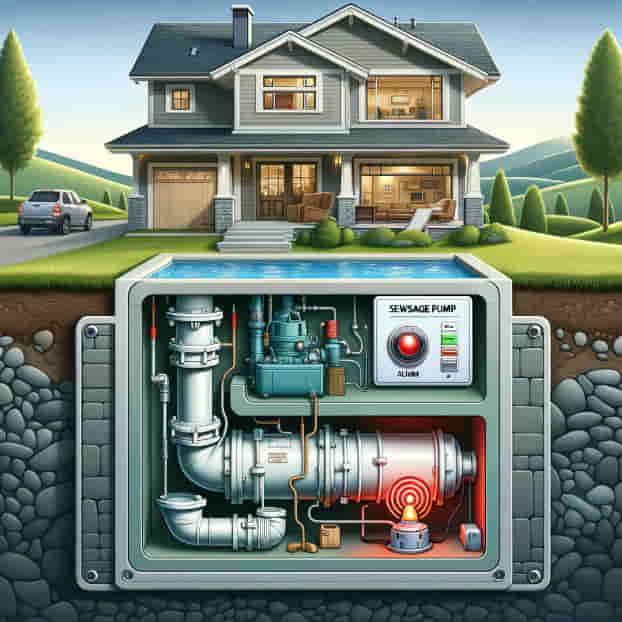For most homeowners, the sewage pump and alarm system tucked away in the basement or yard is an out-of-sight, out-of-mind utility. However, when that system fails due to a power outage, heavy rains, or pump breakdown, an absent or malfunctioning alarm can allow waste water to back up into the home undetected, resulting in expensive water damage and posing health risks. This guide will provide homeowners with information on how sewage pump alarm systems work, why proper function is critical, and how to test an alarm system to ensure it works when needed most.
What is a Sewage Pump Alarm System
A sewage pump alarm system consists of an electric pump used to push waste water from a home into the municipal sewer system and an alarm designed to detect pump issues and alert homeowners. Most pump systems include either an audible alarm that sounds when the pump malfunctions or a visual alarm to alert homeowners. Some systems also include an autodialer device that will automatically place phone calls or send text messages to alert the homeowner when a malfunction occurs.
Why a Functional Sewage Alarm is Critical?
Sewage pump failures often occur due to power outages, mechanical breakdowns, or periods of heavy rainfall that exceed a pump system’s capacity. Without an alarm to alert that the system is not functioning properly, water can back up into the basement and cause considerable damage. An estimated 20,000 homeowners each year face plumbing disasters resulting from non-functional sewage pump alarms and experience nearly $15,000 in damage on average when waste water backups occur. Preventing even one incident of flooding can justify the minor investment in testing and maintaining an alarm system.
In addition to property damage, pump malfunctions can create serious health hazards if contamination goes undetected. Exposure to unsafe levels of ammonia, bacteria, viruses, mold, and other contaminants often found in waste water can cause illness. The ability to promptly identify pump issues is crucial to prevent these risks. An estimated 12 million cases of recreational water illness occur each year due to uncontrolled exposure to contaminated water sources.
Testing the Alarm System
The most effective means to ensure sufficient warning of pump malfunction or waste backup is testing the alarm system regularly according to manufacturer guidelines. For audible alarms, homeowners should trigger the alarm manually per the product instructions and listen for the alert tone sounding. Any issues with the alarm sound level, sound quality, or failure to alarm should prompt inspection from the installer.
Some systems may offer light indicators when an alarm is sounding that homeowners can use to visually confirm function during routine tests. If the alarm system relies on making phone calls, receiving a test call at the preprogrammed number confirms this auto-dialer feature works. For more complex pump/alarm systems, an annual inspection by a contractor is recommended to check all system components thoroughly.
Taking Action When an Alarm Occurs
While routine tests are useful for verifying function, alarms can still fail when actual pump malfunctions occur. Homeowners may be away from home and unable to hear audible alerts when such failures happen. For this reason, some pump installations will also include a high water sensor separate from the alarm system to detect flooding in case other system warnings go unnoticed.
If the alarm is triggered, homeowners should first silence the audible alarm, then immediately check the pump and determine why it malfunctioned. Steps like checking circuit breakers, clearing debris from pump inlets, or confirming filters are not blocked can often get systems working again temporarily. However the underlying cause of failure should still be determined to decide if repairs or replacements are needed by a professional.
Any amount of flooding or waste backup should prompt cleanup work using proper protective gear and cleaning methods to ensure areas are fully sanitized after contamination. In more severe cases, professional restoration services may be necessary if waste water has soaked deeply into walls or building materials. Catching system failures early is critical to reducing long-term repair costs.
An Ounce of Prevention
Like insurance, no one wants to purchase sewage pump alarms until an unfortunate incident makes the need painfully clear. However, a minor investment in regular inspection and testing delivers invaluable protection from property damage, dangerous health hazards, and costly headaches. Ensuring that sewage pumps and warning systems are maintained properly can prevent the messy, expensive consequences when these unseen protectors stop working as designed. Peace of mind is priceless when it comes to keeping our largest investments and sanctuaries—our homes—safe from harm.
In conclusion, the importance of sewage pump alarm systems cannot be overstated. Often overlooked, these systems play a crucial role in preventing water damage and health hazards caused by sewage pump failures. The guide emphasizes the significance of a functional alarm, detailing the potential consequences of undetected malfunctions, from costly property damage to serious health risks. Regular testing and maintenance are highlighted as key preventive measures, offering homeowners peace of mind and safeguarding their homes from the unseen threats of sewage backups. Ultimately, investing in the proper care of sewage pump alarm systems proves to be a minor yet invaluable step in protecting homes from the messy and expensive aftermath of system failures.
